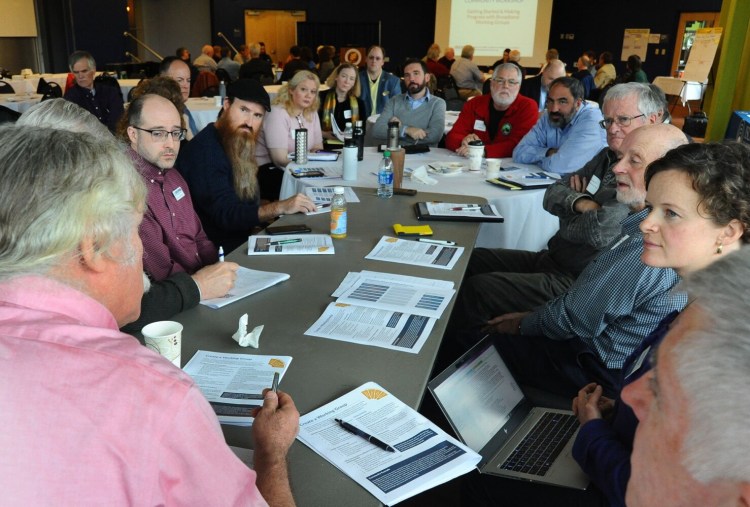WATERVILLE — The annual Maine Broadband Summit at Thomas College kicked off Monday with representatives from communities throughout the state gathering to discuss ways to improve internet service, especially to rural areas.
Like many states with comparatively small populations, it is difficult for Maine to deliver broadband — or high-speed internet — in rural communities because of low population density, rugged terrain and cost.
Broadband has different methods of delivery throughout the state, either through copper wires or fiber optics.
The best fit for today’s technology is fiber optics, thin strands of glass that transport data through light waves with little resistance and allow for greater bandwidth , according to information from Otelco Inc., an Alabama-based telecommunications company that owns small, independent telephone companies in Maine, Massachusetts, West Virginia, Missouri and Alabama.

Karen Miller of Roque Bluffs participates Monday in the Maine Broadband Summit at Thomas College in Waterville. Morning Sentinel photo by Rich Abrahamson
Experts agree broadband has become essential for local economic development throughout the state, nation and world, but it is equally important to education, professional development, home-based health care, eldercare, social engagement and e-government, according to the Island Institute, which is based in Rockland and works to sustain Maine’s island and coastal communities.
Overall, residential broadband access in the state is inadequate, especially in many rural areas and along much of the coast. There is little or no access on the islands off the Maine coast, according Island Institute data.
The annual, two-day broadband summit is hosted by Maine Broadband Coalition in partnership with the Island Institute, GrowSmart Maine, Fourth Economy Consulting and the ConnectME Authority. Its focus is on bringing communities together to discuss the challenges in bringing high-speed internet to more of Maine.
In Monday’s morning session, about 60 people representing communities throughout Maine split into groups to share their concerns, advocate for their communities and set goals for the rest of the conference.
The groups also explored financial options and what would work best for each community or region.
One of the main issues the groups identified is the smallness of many rural communities, and their inability to bring broadband service to residents and businesses — in part because of inadequate funding.
One solution could be to tackle the broadband problem on a regional basis instead of community by community. Participants at the summit also said local elected officials must be pushed to work with residents and find other strategies to expand broadband to less-populated areas.
Belfast, for example, used postcards to direct residents and business owners to a web-based survey on local internet needs and access. Many people responded.
Summit participants also discussed the Three-Ring Binder, an internet “superhighway” that was completed in 2012 and supplied the infrastructure to quickly transmit large amounts of data.
At the time, it helped more than 100 communities in rural areas of Maine connect to high-speed internet. At the outset, the project connected more than 110,000 households, 600 schools, libraries and 38 governmental buildings.

Bob McIntire, right, of AARP of Maine focuses his attention on the discussion Monday at the Maine Broadband Summit at Thomas College in Waterville. At left: Thomas Bartell of the Windham Economic Development Corp. Morning Sentinel photo by Rich Abrahamson
High-speed networks have allowed some towns throughout the state to become more accessible, which helps to attract businesses.
Such access improves a variety of services, including videoconferencing, which has almost unlimited applications in business, research, education, health care and mental health.
According to BroadbandNow.com, Maine is the 13th most-connected state, with 10% of its population underserved. The Island Institute, meanwhile, says many Maine businesses would benefit significantly from improved access high-speed internet access.
The broadband summit continues Tuesday at Thomas College on West River Road with sessions led by state and regional leaders and technical experts.
Programming begins at 8:50 a.m. with discussions on high-speed internet infrastructure and economic development, telehealth, building community networks and broadband funding.
A keynote presentation, “Moving Maine Forward with Broadband,” is scheduled for noon.
Comments are not available on this story.
Send questions/comments to the editors.



